|
|
|
Sort Order |
|
|
|
Items / Page
|
|
|
|
|
|
|
| Srl | Item |
| 1 |
ID:
110089
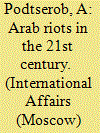

|
|
|
|
|
| Publication |
2011.
|
| Summary/Abstract |
THE WAVE OF POPULAR RIOTS which swept the Middle East and North Africa and which remains the key factor behind the regional developments engulfed not only the poor countries but also those which coped both socially and economically.
Between 2004 and 2009, for example, Tunisia increased per capita income from 3.5 thousand Tunisian dinars ($2.7 thousand) to 5 thousand TND ($3.9 thousand); its middle class (60% of population) accounted for 83% of total consumption; 80% were house owners; 21% had cars. In oil-rich Libya the year 2011 began very much as usual: foodstuffs and money were distributed among the poor; some families received free car coupons practically on the eve of the uprising.1
|
|
|
|
|
|
|
|
|
|
|
|
|
|
|
|
| 2 |
ID:
110087
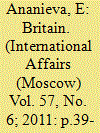

|
|
|
|
|
| Publication |
2011.
|
| Summary/Abstract |
BROKEN GLASS has been already removed but the August riots in Britain left a "broken society" behind them: an emergency session of the Commons; a prime minister promising to track down and to punish wrongdoers; the leader of the opposition pledging to stand shoulder to shoulder with him. It was as if the country was at war.1
Politicians and analysts tried to go to the roots, to identify the causes and suggest remedies: there was no shortage of explanations ranging from "rap music which glorifies violence and loathing of authority" to "no father at home" to get from him "a positive sense of masculinity," and the mortgage crisis.
|
|
|
|
|
|
|
|
|
|
|
|
|
|
|
|
| 3 |
ID:
110095
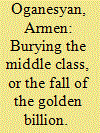

|
|
|
|
|
| Publication |
2011.
|
| Summary/Abstract |
THE CURRENT ECONOMIC DOWNTURN, like others before it, has shattered many dreams. But this is the first to have devastated so many people at once, regardless of class or social status - from pauper to prince. Thanks, globalization.
Well, globalization is not entirely to blame. A crisis like the present one has never befallen such an affluent society, one that has become accustomed to prosperity and opportunities on a mass scale.
Despite the tensions of the Cold War (or possibly thanks to them), the decades of postwar stability generated an unprecedented surge in technology and consumption. Ordinary Europeans and Americans had been breathing the illusory air of the "end of history" long before Francis Fukuyama made his famous prophecy.
|
|
|
|
|
|
|
|
|
|
|
|
|
|
|
|
| 4 |
ID:
110098
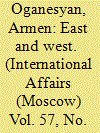

|
|
|
|
|
| Publication |
2011.
|
| Summary/Abstract |
A WEEK BEFORE TRIPOLI FELL to the insurgents, a glamour model and ex-girlfriend of Mutassim, one of Colonel Gaddafi's sons, had come to the Libyan capital. Talitha van Zon, the former Playboy centerfold, who claimed that she had parted with Mutassim Gaddafi several years ago, could not explain why she came to the country torn apart by a civil war.
In any case very soon the toasts to a victory over the rebels were drowned out by the sounds of shooting and shouts by the same rebels at doors of her hotel. "The Dutch model was then paraded in front of rebel fighters who chanted 'petrol.' She feared they would 'burn her alive' and then made a desperate escape by leaping from the hotel's balcony" breaking her hand. Rescued by a Dutch journalist who helped her, together with other refugees to leave the country on a humanitarian ship, she reached Malta. The media all over the world informed their readers and viewers that "glamour model ex-girlfriend of Gaddafi's son escapes rebels after they threatened to 'burn her alive'" the reports supplied with a lavish selection of her photos.
|
|
|
|
|
|
|
|
|
|
|
|
|
|
|
|
| 5 |
ID:
110085


|
|
|
|
|
| Publication |
2011.
|
| Summary/Abstract |
THE EUROPEAN UNION is a meta-state - it is not a state yet, but it is no longer a regional organization. The EU has the attributes of statehood in the form of its own currency, customs area, bodies of governance, parliament, central bank, but there are still national governmental agencies while the powers of EU bodies in the sphere of defense and security are very limited. On the one hand, national government institutions enjoy clear priority; on the other, members of both the EU and NATO delegate part of their sovereignty in the sphere of defense and security to NATO agencies. As a result, a split system of sovereignty is the most prominent characteristic of countries in the European Union. The system of governance in the EU is excessively bureaucratic, excessively geared to reaching consensus and thus does not provide for sufficient concentration of power enabling prompt and resolute action in crises.
|
|
|
|
|
|
|
|
|
|
|
|
|
|
|
|
| 6 |
ID:
110090


|
|
|
|
|
| Publication |
2011.
|
| Summary/Abstract |
AT ALL TIMES, the ideas that institutes placed above state sovereignties or even acting instead of states (that is, appropriating their functions and powers) were based on the universalist theories saying that an ideal international order (patterned on social order) and corresponding models of all sorts were possible. Up till the mid-20th century, those who spoke of global institutes of governance and regulation limited their powers to the war and peace issues. The authors were convinced that these supreme institutes should overrule the personified sovereignty of monarchs and feudal lords (and nation-states of the later period). Individual or group unofficial projects were mainly suggested by idealistic ideological imperatives rooted in corresponding social-economic bases. In the 17th century, capitalism in Europe which spilled over to colonies became the determining factor.
|
|
|
|
|
|
|
|
|
|
|
|
|
|
|
|
| 7 |
ID:
110093
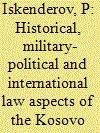

|
|
|
|
|
| Publication |
2011.
|
| Summary/Abstract |
THE DETERIORATION of the situation in the Serb-populated northern part of Kosovo, paralleled by the deepening of the EU crisis, underscored the inefficiency of the efforts and approaches supposed to help resolve a bitter dispute over Serbia's breakaway province. It became abundantly clear that the attempts made since late 2010 to reach compromise via technical talks between Belgrade and Pristina radicalized both parties to the conflict and put in jeopardy the fragile political balance across the Balkans rather than produced appreciable results. The cause of the problem is that since the late 1990s the U.S. and the EU have been engaging in geopolitical games around Kosovo, considering the province as a proving ground for strategies waiting to be applied on a much wider scale and aimed at putting greater territories with their natural resources and infrastructures under Western control. Due to the complexity of the legacy with which the region is burdened and to the interplay of divergent present-day influences, the West's Kosovo project failed to reach completion, tensions in and over the province became chronic, and the EU saw its already questionable unity in foreign policy and military affairs seriously eroded.
|
|
|
|
|
|
|
|
|
|
|
|
|
|
|
|
| 8 |
ID:
110086
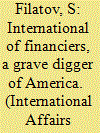

|
|
|
|
|
| Publication |
2011.
|
| Summary/Abstract |
LATE IN JUNE, the U.S. Congress treated the world to a fight between the Republican and Democratic deputies and the Obama Administration over the debt ceiling. The world responded with different assessments of what it had seen: political struggle; a Hollywood soap opera with an inevitable happy ending; an attempt at rescuing American economy or at blackmailing the world markets; some people suspected that this was an outcrop of the eternal confrontation between the American industrial and financial lobbies.
|
|
|
|
|
|
|
|
|
|
|
|
|
|
|
|
| 9 |
ID:
110091
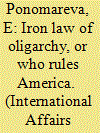

|
|
|
|
|
| Publication |
2011.
|
| Summary/Abstract |
ROBERTO MICHELS (1876-1936), historian and sociologist highly valued in the West, not merely explained why the majority could not govern itself. He was a fascist sympathizer who joined the fascist party of Italy in 1928. Mussolini made him professor of economics and the history of doctrines at the University of Perujia where he helped organize a "fascist faculty" of political science to create "new political thinking" and "train professional fascist leaders." His works are part of the political science curricula while his Political Parties: A Sociological Study of the Oligarchical Tendencies of Modern Democracy written in 1911 contains the so-called "iron law of the oligarchical tendencies" better known as the "iron law of oligarchy." Its author argued that to be efficient democracy needed an organization of an "active minority" (the elite) since direct rule of large masses was technically impossible and kills democracy. "It is organization which gives birth to the domination of the elected over the electors... of the delegates over the delegators. Who says organization says oligarchy."1
|
|
|
|
|
|
|
|
|
|
|
|
|
|
|
|
| 10 |
ID:
110094


|
|
|
|
|
| Publication |
2011.
|
| Summary/Abstract |
IN THE 20TH CENTURY, time stalled in Turkey and decline reigned. During World War I, the country was falling apart under the blows of foreign armies which came to grab the rich territories of the Middle East. Having lost Palestine, Syria, Lebanon, and Iraq it shrank to its historical minimum. Tukey's foreign policy impact hinged on the Black Sea straits' exceptional geographic importance and was limited to Asia Minor.
|
|
|
|
|
|
|
|
|
|
|
|
|
|
|
|
| 11 |
ID:
110099
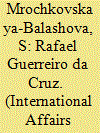

|
|
|
|
|
| Publication |
2011.
|
| Summary/Abstract |
OVER 100 YEARS AGO, the Russian Academy of Sciences received from Paris a vast archive of the Turgenev brothers (their letters, diaries and other documents) repatriated by son of Nikolai Turgenev. Alexander Fomin* who had done a lot to bring the precious documentary collection to Russia spent many years reading, studying and, bit by bit, publishing it. The students of Pushkin and his epoch were jubilant: the legends and stories which came down to them by word of mouth and tales yarned by the few who outlived the epoch of the great poet - in short, everything on which the Pushkin studies had been standing - could be confirmed (or disproved.) By that time, all contemporaries of the great poet had been dead - there was nobody to raise havoc, to object and to condemn the violators of ethics.
|
|
|
|
|
|
|
|
|
|
|
|
|
|
|
|
| 12 |
ID:
110096


|
|
|
|
|
| Publication |
2011.
|
| Summary/Abstract |
INTERNATIONAL TRADE IN COMMODITIES is the most traditional form of international trade and makes up more than 20% of world exports. Minerals account for more than 12%, and agricultural commodities and food, for about 9%.
The main distinctive feature of mineral and agricultural resources is their uneven distribution. Their production or cultivation is mostly concentrated in a relatively few countries. The consumption of these resources is even more concentrated. Moreover, the consumption of mineral and agricultural raw materials usually does not coincide with the areas of their production and processing. There is a wide gap between producing and consuming countries, and this enhances the role of world markets in the redistribution of resources. The share of exported oil reaches 55% of its production; about 46% of all iron ore produced in the world, 43% of copper ore, 37% of zinc, etc., is exported. As for agricultural commodities, 25% of total output is supplied to the world market.
|
|
|
|
|
|
|
|
|
|
|
|
|
|
|
|
| 13 |
ID:
110100


|
|
|
|
|
| Publication |
2011.
|
| Summary/Abstract |
WHEN IN CUBA, we were looking around the Havana City Museum when a big old portrait caught our attention. At the bottom of the painting was this inscription characteristic of the Cuban portrait painter Juan del Rio: El Señior Don Ignaio Montalvo de Ambulodi Conde de Casa Montalvo, Gentil Hombre de Cámara de Su Majestad con entrada de Brigadier de los Reaies Ejércitos. Coronel de Regimento de Dragones de Matanzas, Caballero en Orden de Santo, ... Socio numerario de la Real Sociedad Economica (Brigadier of the Royal Spanish Armies, Colonel of the Dragoons Regiment in Matanzas, Prior of the Real Consulado in Habana, Gentleman of the His Majesty's Chamber, Member of the Sociedad de Amigos del País, and Knight of the Order of Santiago, founder of La Real Sociedad Económica).
|
|
|
|
|
|
|
|
|
|
|
|
|
|
|
|
| 14 |
ID:
110084


|
|
|
|
|
| Publication |
2011.
|
| Summary/Abstract |
AS FOREIGN MINISTER, S.V. Lavrov has witnessed two stages in the development of Russia and the world: the relative wellbeing and the profound financial and economic crisis that has not as yet ended despite the "incantations" from experts to the effect that there are no objective prerequisites for the deepening of the crisis. Obviously the impact of subjective factors on recent history is rapidly growing. Hence the concerns about the irrationality and chaos of the contemporary world, which has yet to overcome the global historical crisis caused by the disintegration of the bipolar system.
|
|
|
|
|
|
|
|
|
|
|
|
|
|
|
|
| 15 |
ID:
110092


|
|
|
|
|
| Publication |
2011.
|
| Summary/Abstract |
THE IDEA OF BUILDING a gas pipeline from Central Asia to Pakistan and India with transit through Afghanistan first came to light in the Soviet Union as early as the 1980s. However, the war in Afghanistan prevented this project from being developed. In 1993, Bridas S.A.P.I.C. (Argentina) revived this idea by presenting former President of Turkmenistan Saparmurat Niyazov with the Trans-Afghan Gas Pipeline project.1 Two years later, the leaders of Turkmenistan and Pakistan signed an agreement on drawing up a technical feasibility report. * At this time, the Americans, who were trying to build up their geopolitical influence in Central Asia, also joined its development. In 1995, America's Unocal appeared on the Turkmen market, managing to displace Bridas SA.P.I.C. with the support of the U.S. Department of State. It is worth noting that, according to certain data, the current Afghan leader Hamid Karzai worked for Unocal right up until 2001.2 The Afghans also supported the idea of the project; the "good" members of the Taliban were enthusiastic about the Turkmenistan-Afghanistan-Pakistan-India (TAPI) gas pipeline project, insisting that the United States hold talks with them as the representatives of Afghanistan.3
|
|
|
|
|
|
|
|
|
|
|
|
|
|
|
|
| 16 |
ID:
110102


|
|
|
|
|
| Publication |
2011.
|
| Summary/Abstract |
AN EXPANDED SESSION of the Supervisory Council of the Center for the History of the Russian Diplomatic Service, which is popularly called a museum, was held at the Russian Ministry of Foreign Affairs on the occasion of the Center's tenth anniversary. First Deputy Minister of Foreign Affairs Andrei Denisov noted in his opening speech that people quickly become accustomed to the good things in life. In just ten years, we have grown so accustomed to the fact we have a museum; it is difficult to imagine how we lived without it.
|
|
|
|
|
|
|
|
|
|
|
|
|
|
|
|
| 17 |
ID:
110097
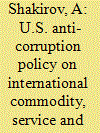

|
|
|
|
|
| Publication |
2011.
|
| Summary/Abstract |
IN THE STUDY OF THE REGULATION of the export of goods, services, and capital, scholars traditionally focus on the regulation of their export from the territory of a country - in particular, the export of goods, export quotas, export control systems, state support of exports, etc. Nevertheless, in the regulation of exports, leading countries are giving increasing importance to lowering trade and investment barriers abroad and assuring favorable conditions on international markets for national exporters and investors, which is reflected, among others, in the U.S. National Export Initiative that was adopted in 2010. For this reason, I propose separating two different types of export regulations: (1) the regulation of the export of goods, services, and capital from a country's territory and (2) the regulation of the import of goods, services, and capital to the markets of foreign countries.
|
|
|
|
|
|
|
|
|
|
|
|
|
|
|
|
| 18 |
ID:
110088
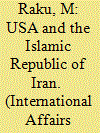

|
|
|
|
|
| Publication |
2011.
|
| Summary/Abstract |
EXPERT FORECASTS that international "peacekeepers" headed by the USA would take a break after Iraq and Afghanistan did not bear out. The "humanitarian operation" in Libya is drawing to a close, and Syria and Yemen are on deck. One wonders who will be next.
The Libyan drama involuntarily brings to mind the U.S. air strikes against Tripoli in 1986. They were followed by the U.S.-Iran armed conflict in the Persian Gulf in 1987-1988. What place do Western "scriptwriters" give Iran today? In view of the new escalation of the situation in the Greater Middle East, a retrospective analysis of the conflict between the U.S. and the Islamic Republic of Iran can be quite useful for assessing the overall situation in the region and possible development scenarios.
|
|
|
|
|
|
|
|
|
|
|
|
|
|
|
|
| 19 |
ID:
110101
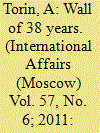

|
|
|
|
|
| Publication |
2011.
|
| Summary/Abstract |
NO OTHER EVENT has had more impact on modern European history than the Berlin Crisis of 1958-1961. Its culmination was the construction on August 13, 1961, of the famous Berlin Wall that divided East and West Germany and consolidated once and for all the existence of two German states - the Federal Republic of Germany and the German Democratic Republic.
The border between East and West Berlin had remained open until August 13, 1961. The dividing line measuring 44.75 kilometers (the total length of the border between West Berlin and East Germany was 164 km) passed directly through streets, houses, canals, and watercourses. Officially, there were 81 street crossing points and 13 passageways in the subway and on the city railroad. In addition, there were hundreds of illegal routes. Every day, between 300,000 and 500,000 people crossed the border between the two parts of the city for different reasons.1 The lack of a clear-cut physical boundary between sectors led to frequent conflicts and the mass departure of specialists to West Germany. East Germans preferred to get an education in the GDR, where it was free of charge, yet work in West Germany.
|
|
|
|
|
|
|
|
|
|
|
|
|
|
|
|
|
|
|
|
|